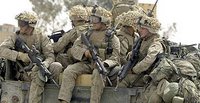Up close: the reality of Iraq's hidden war
 by Sean Smith in Qaim
by Sean Smith in QaimGuardian I was attached to squads from the 3rd Battalion/Sixth Marines and 2nd Battalion/First Marines as they moved into Iraqi towns along the border with Syria.
The US said the aim of Operation Steel Curtain, which began two weeks ago and has now been completed, was to break up insurgent cells and disrupt their supply lines from Syria. The marines worked their way house by house through the border towns along the Euphrates. They had not been in the towns for at least a year and thought they would encounter a lot of insurgents on the first day. But they took only a little fire in Karabila and Husayba, from IEDs (improvised explosive devices) set off in the streets and hidden in walls.
There was more resistance at Ubaydi in the following days. The US went in with tanks, Humvees, helicopters and planes. They swept from one end to the other, searching for weapons. They kicked in doors or used explosives to get in, or used tanks to do it. Humvees went in behind the troops with loudspeakers calling on people to leave.
They encountered Iraqis with guns and rocket-propelled grenades. Two marines were killed, one of them going into a building. I heard it but did not realise what had happened until 20 minutes later. There was a group barricaded in a house and they waited for the soldier to come in and shot him. I saw the body of one of the men who killed him lying in the street.
Five other marines were killed when they went to a farmhouse outside Ubaydi. They were chasing two men, went into the house, and it blew up.
When people saw a ferocious assault was under way, they began to leave town. Women and children came out carrying white flags. It was eerie seeing columns of people appearing through the smoke and explosions, with no one knowing which direction the shooting was coming from. I am sure we will hear of more casualties.
All men of military age were detained. they had material sprayed on their hands to reveal whether they had handled explosives or gunpowder. Families were split up and loudspeakers were barking commands. Some of the detainees came back and some did not.
At Rawa the Iraqi army carried out searches, with US advisers. They did not arrest all males of military age, only those on a two-page list of suspects . They found about 3,000lb of explosives. They took the detainees - about 20 - to a hill overlooking Rawa. There were a lot of mines so it took ages to get there. They were handcuffed all night, with their eyes bandaged. There was no room for everyone in the shelter so some slept outside.
They were given a bottle of water and a blanket, then herded in the morning on to a helicopter and taken to the base at Qaim for questioning.


0 Comments:
Post a Comment
<< Home